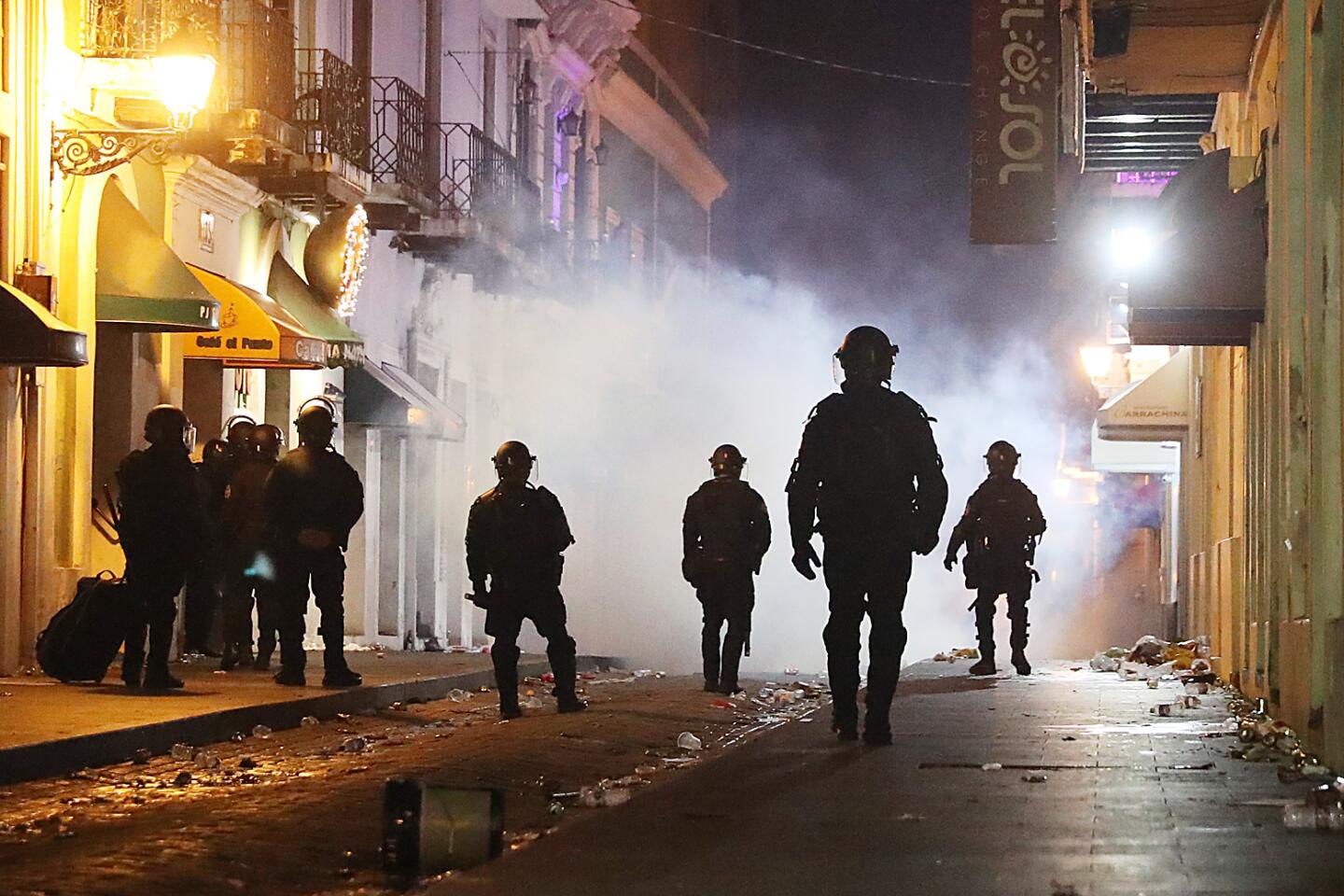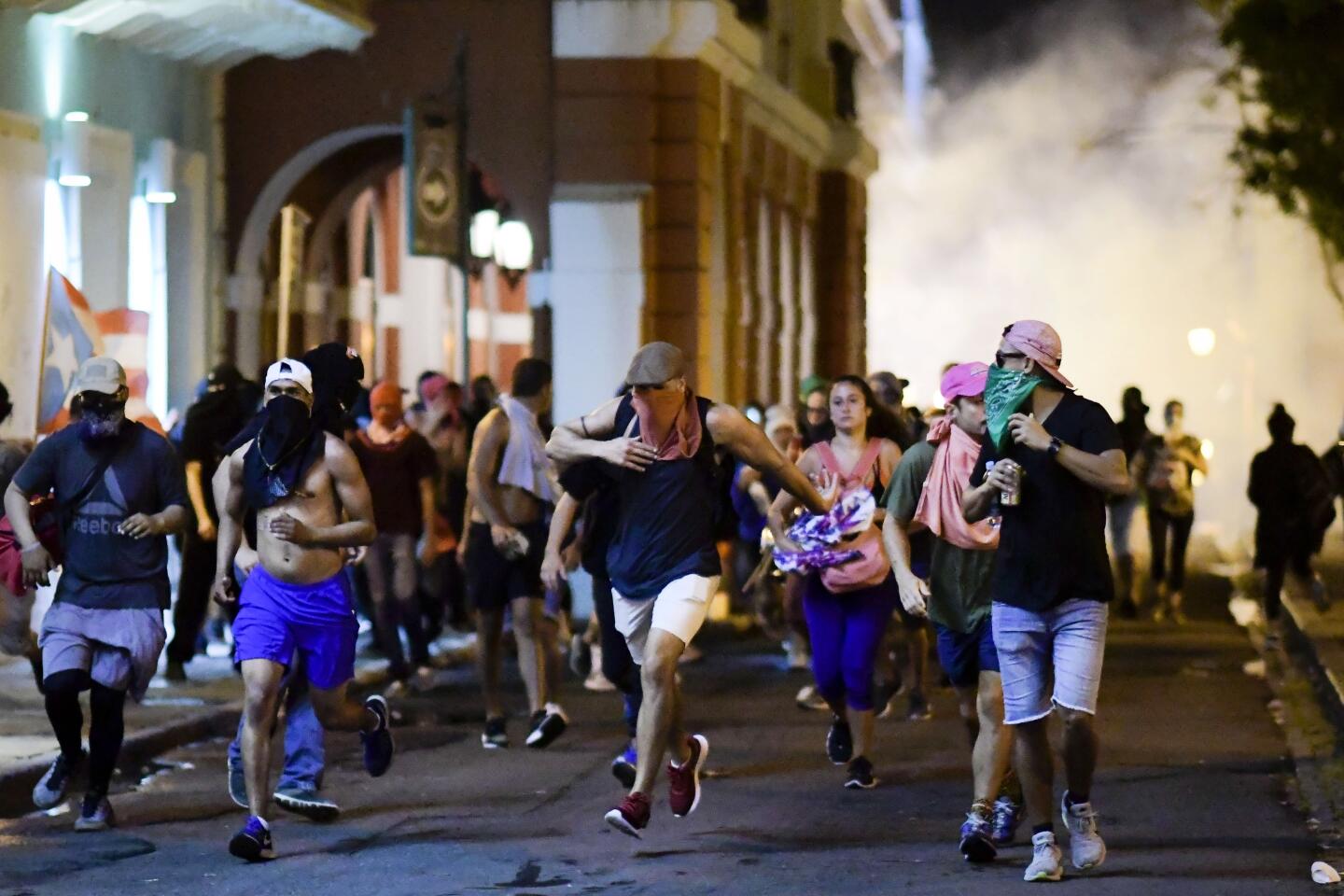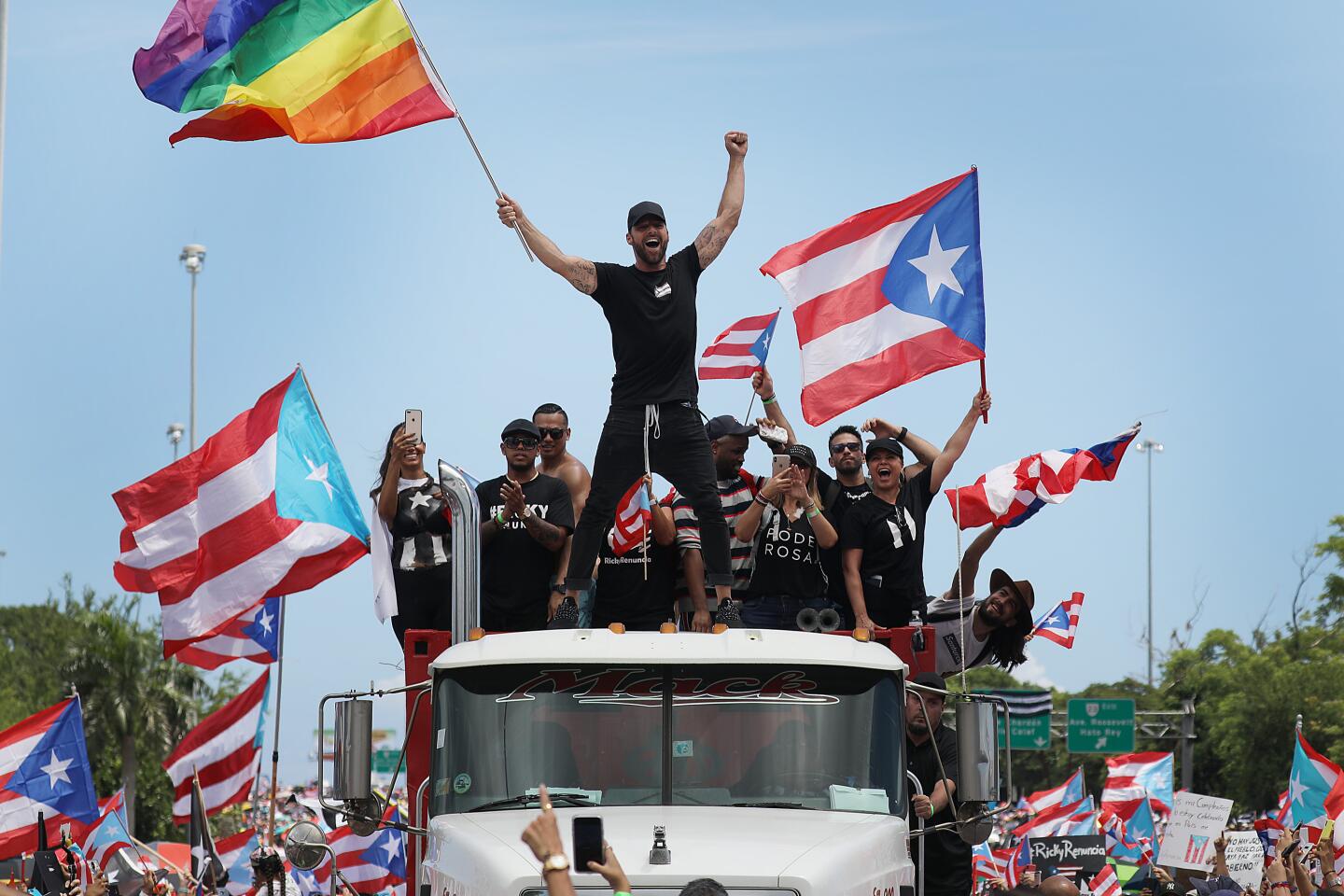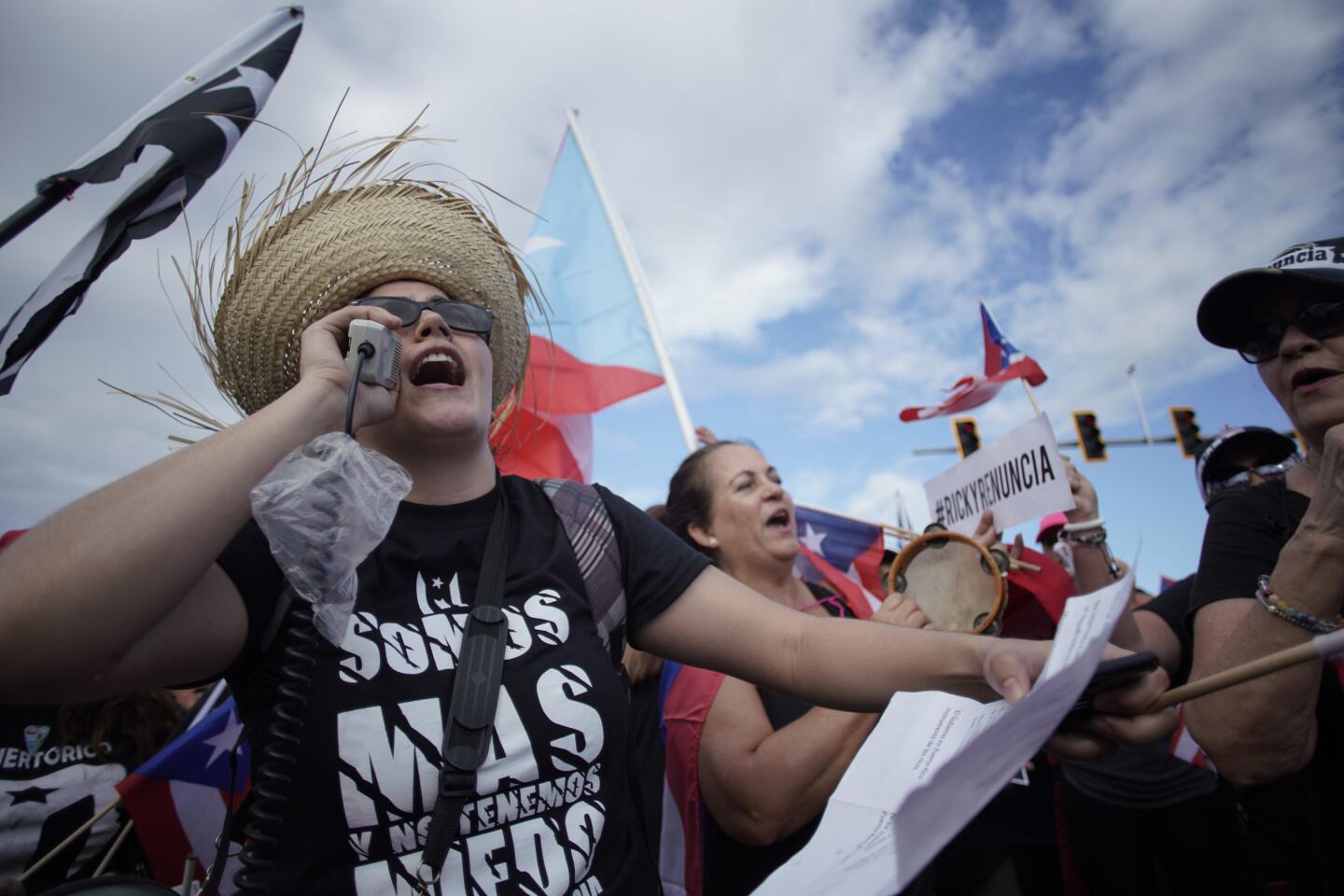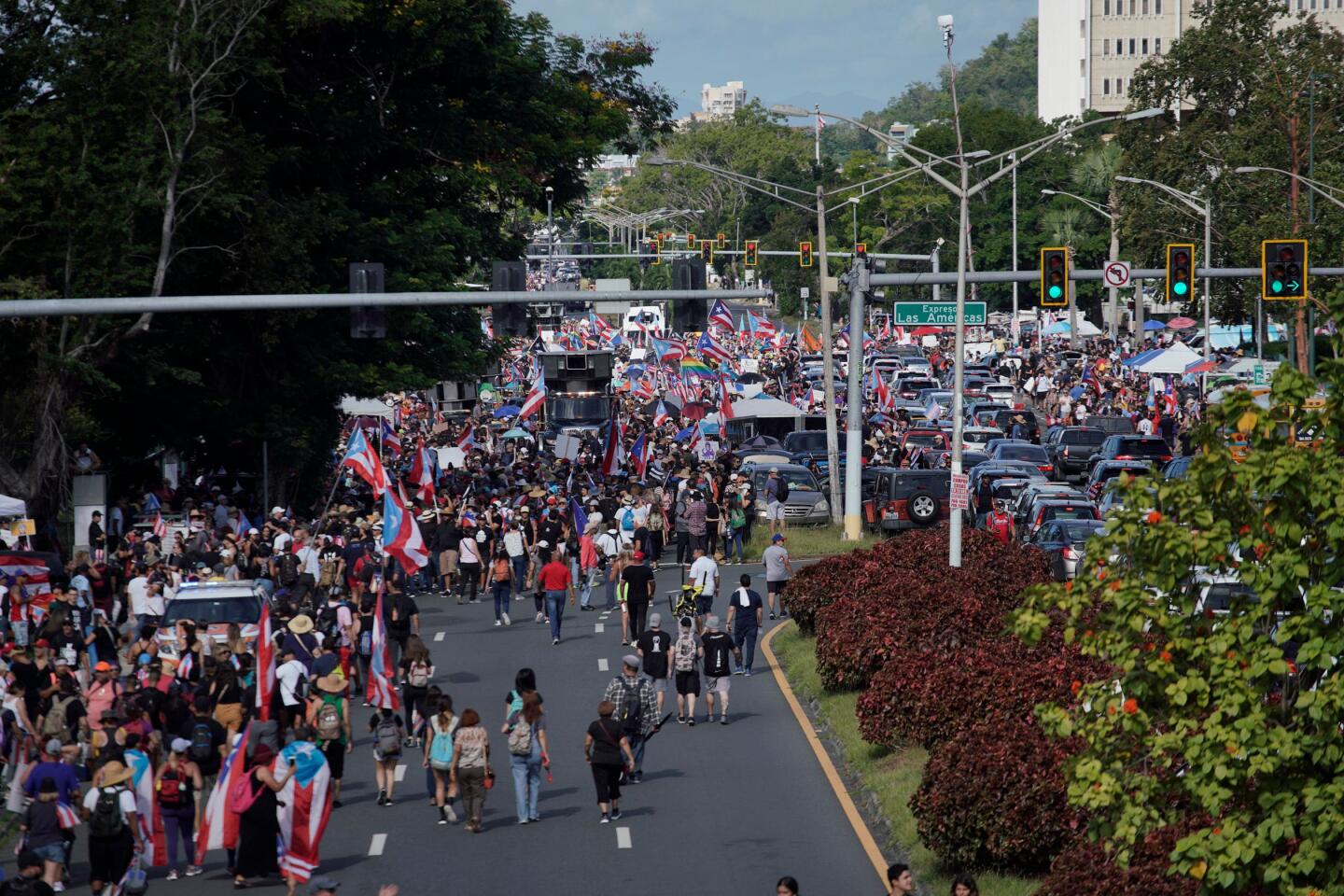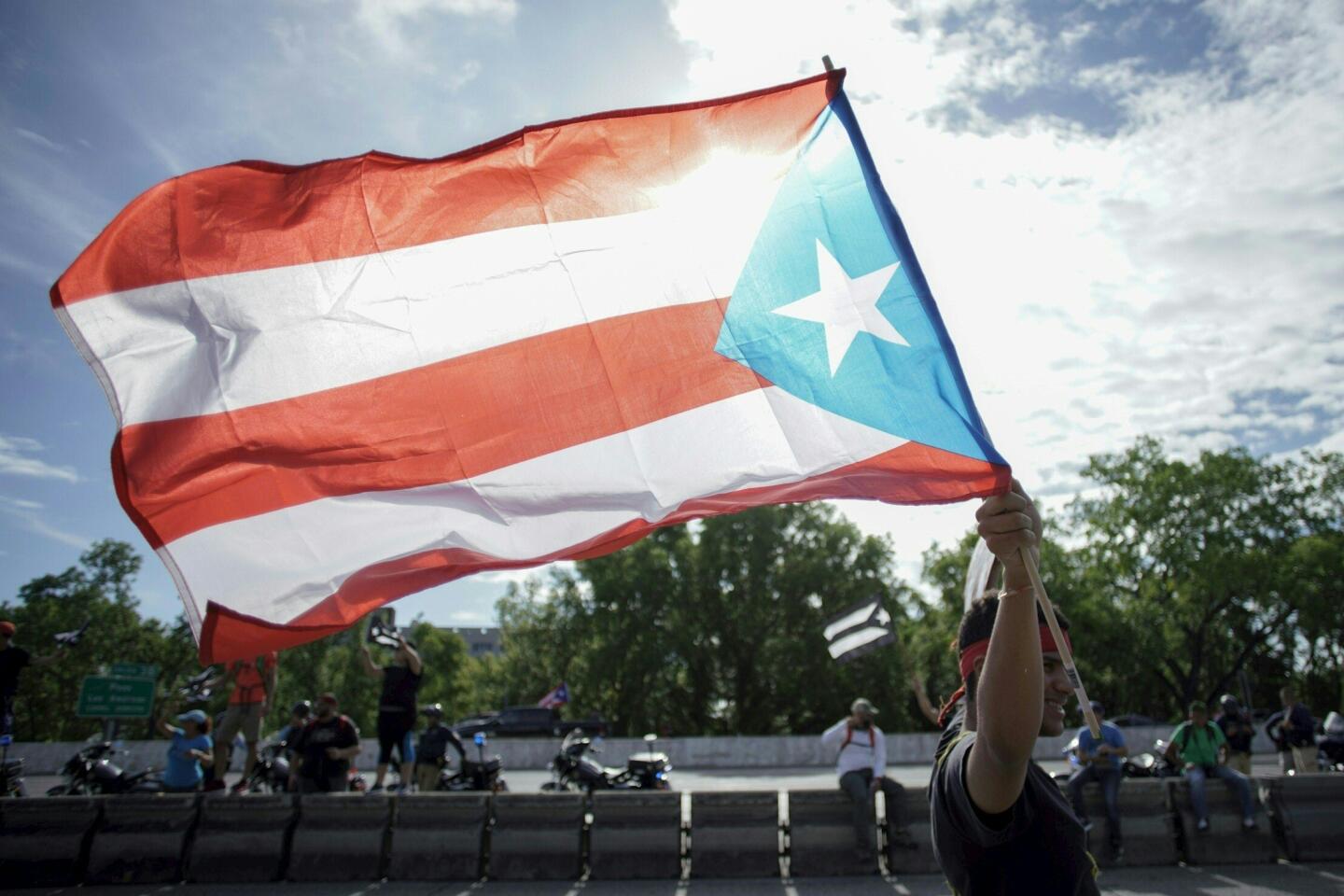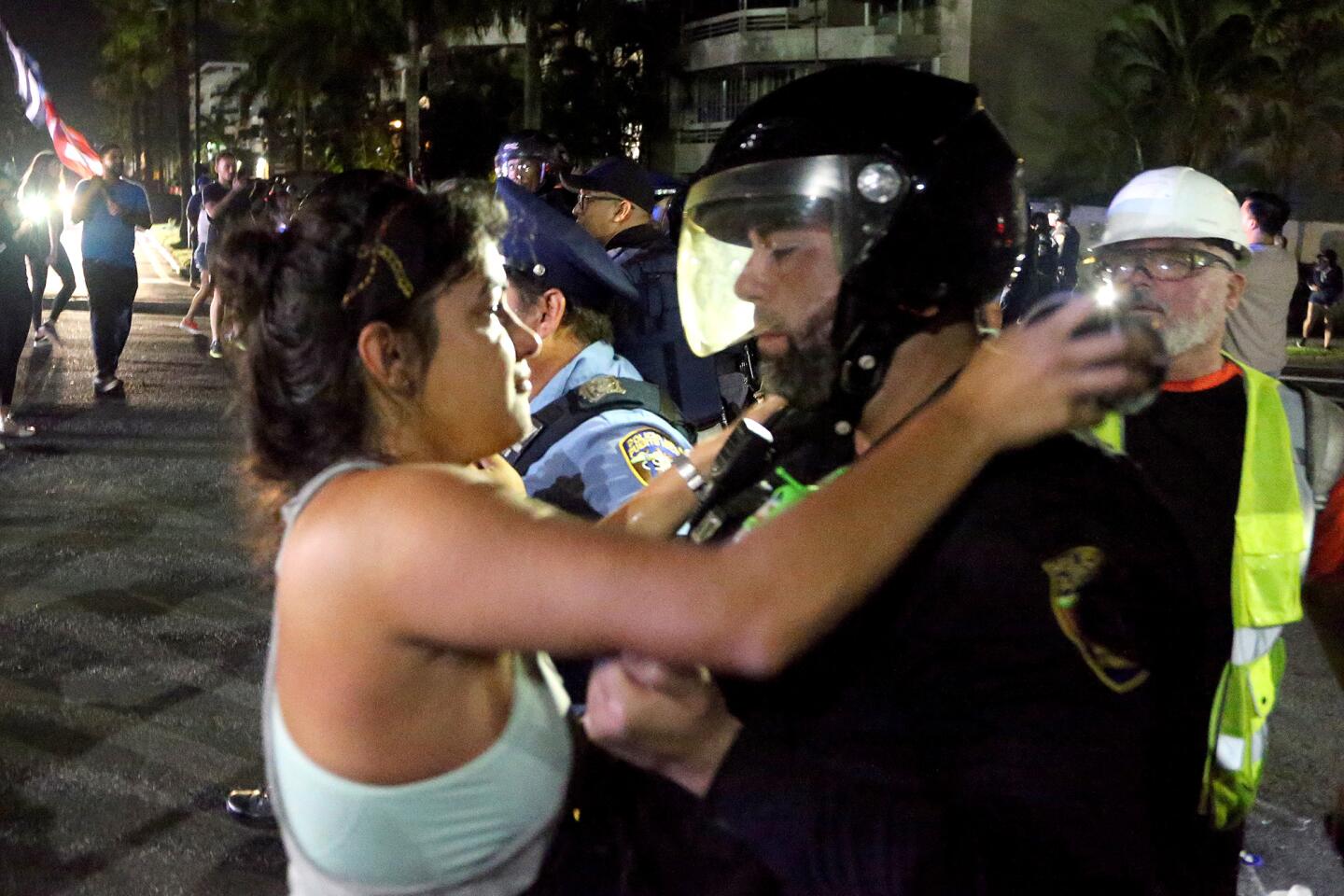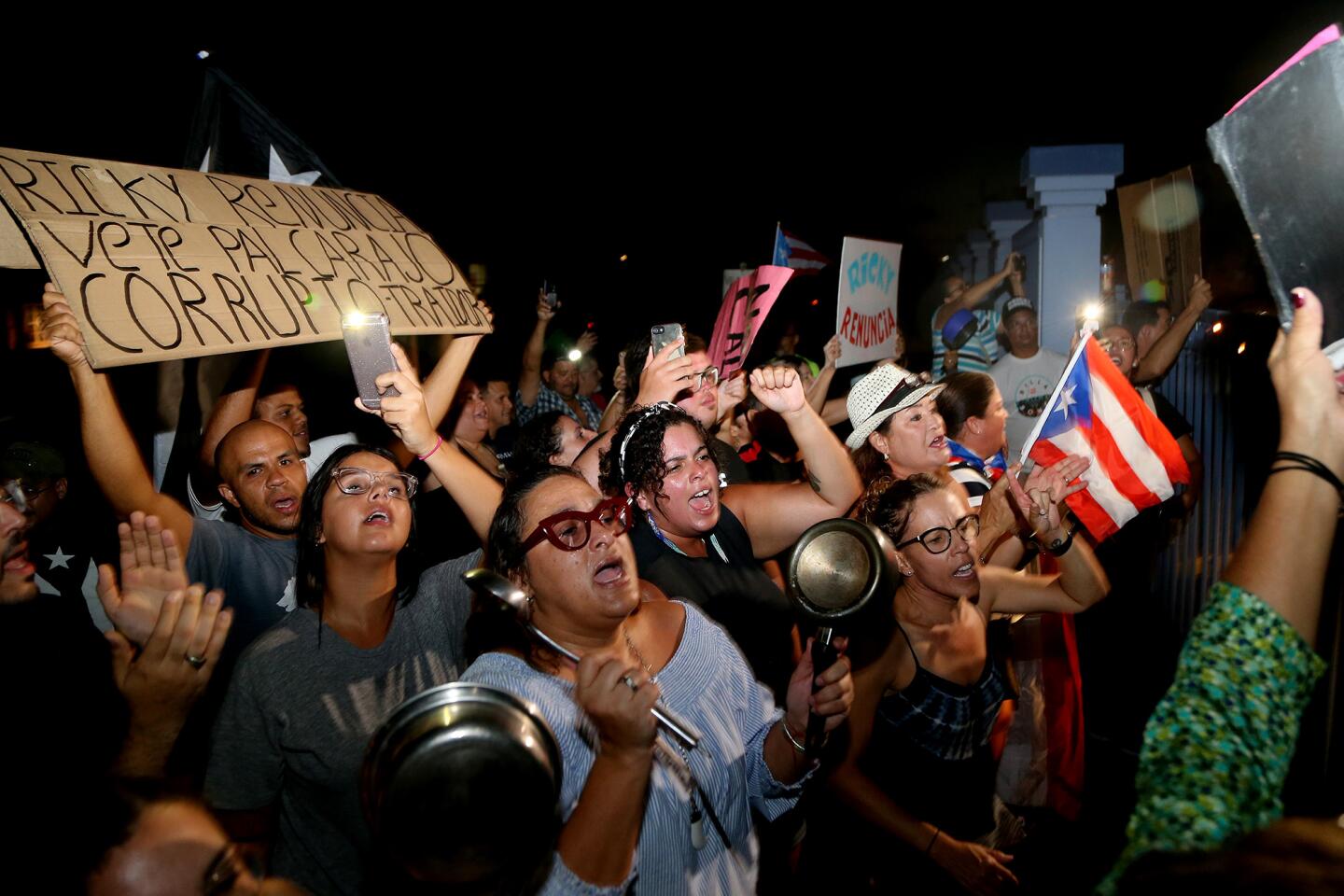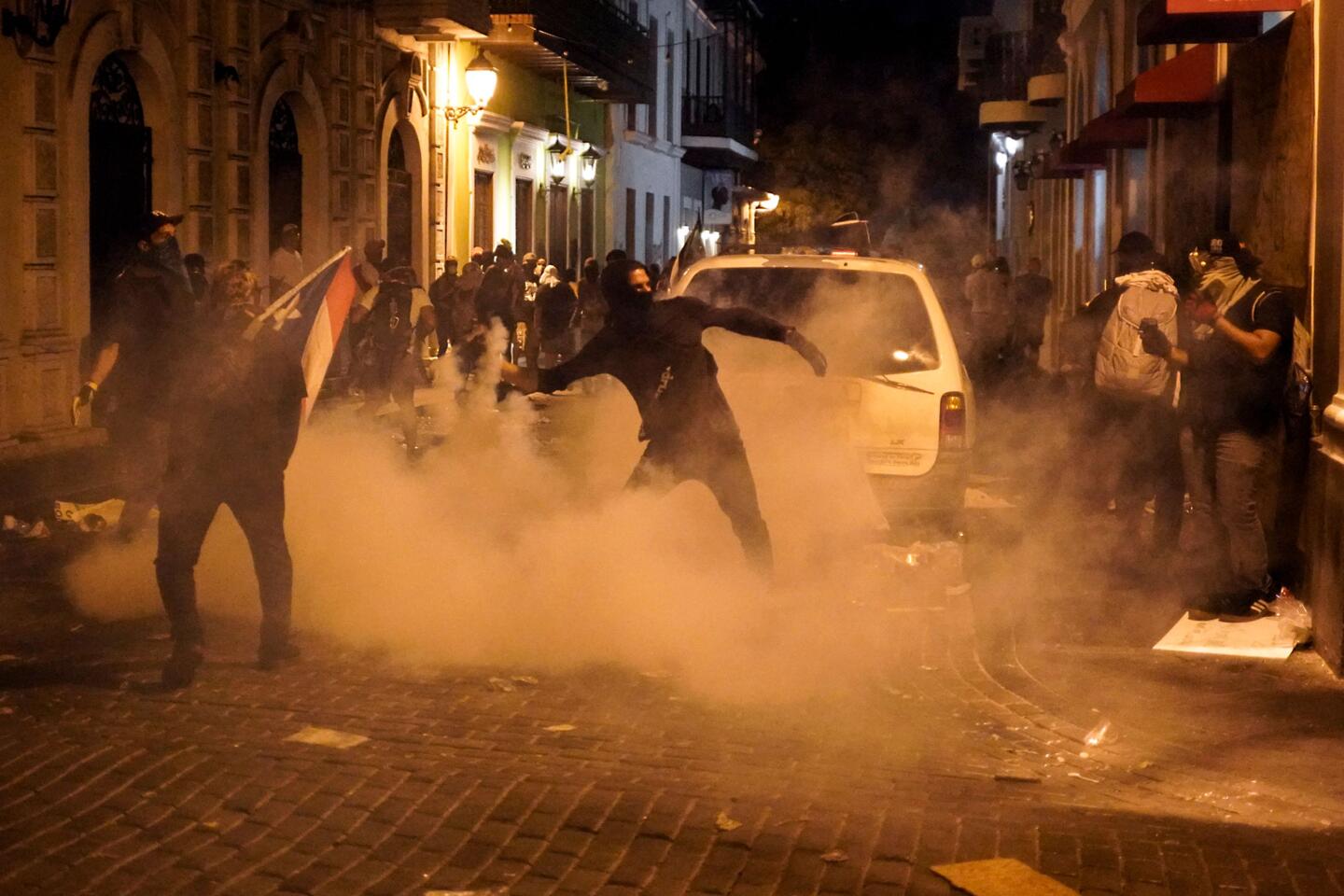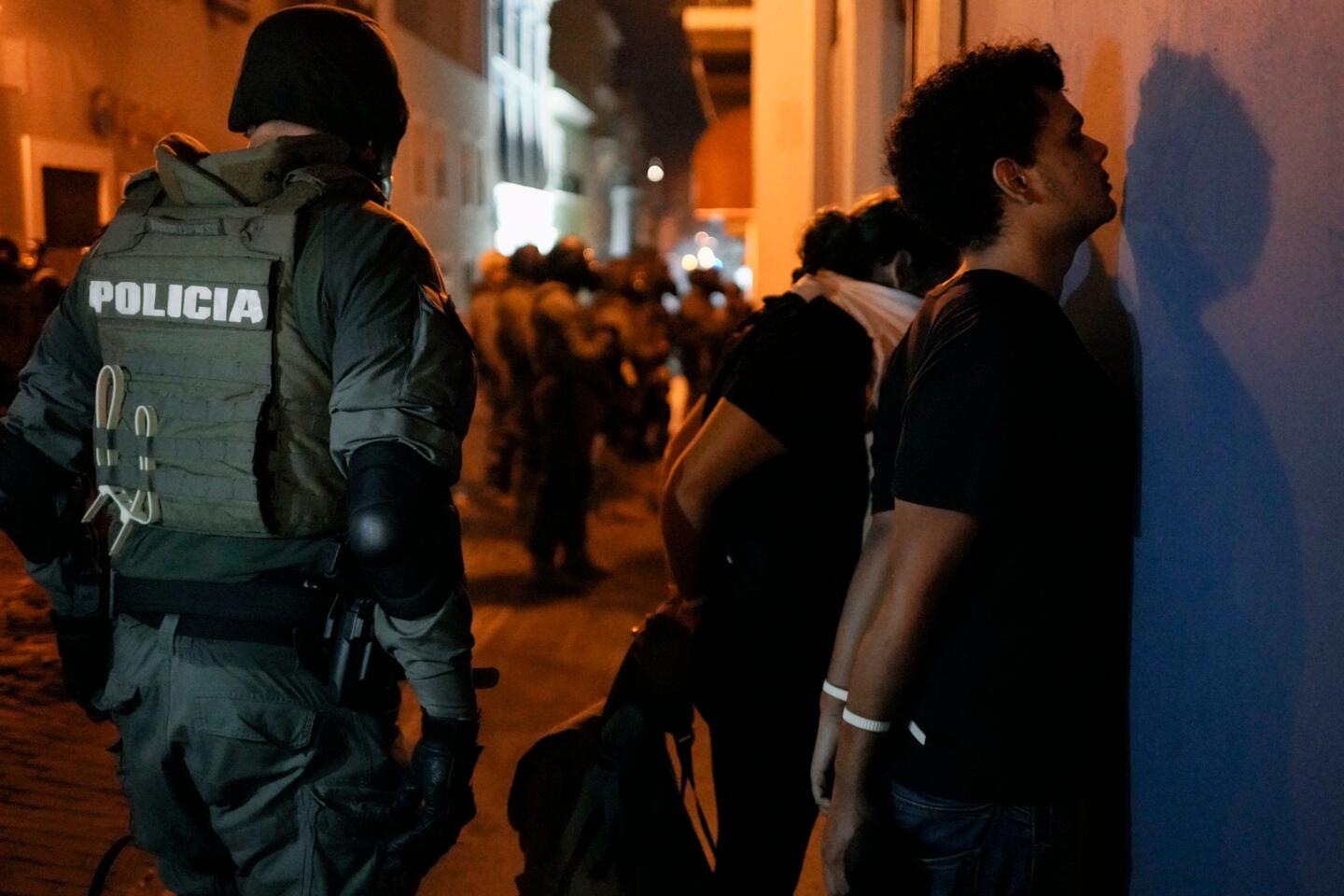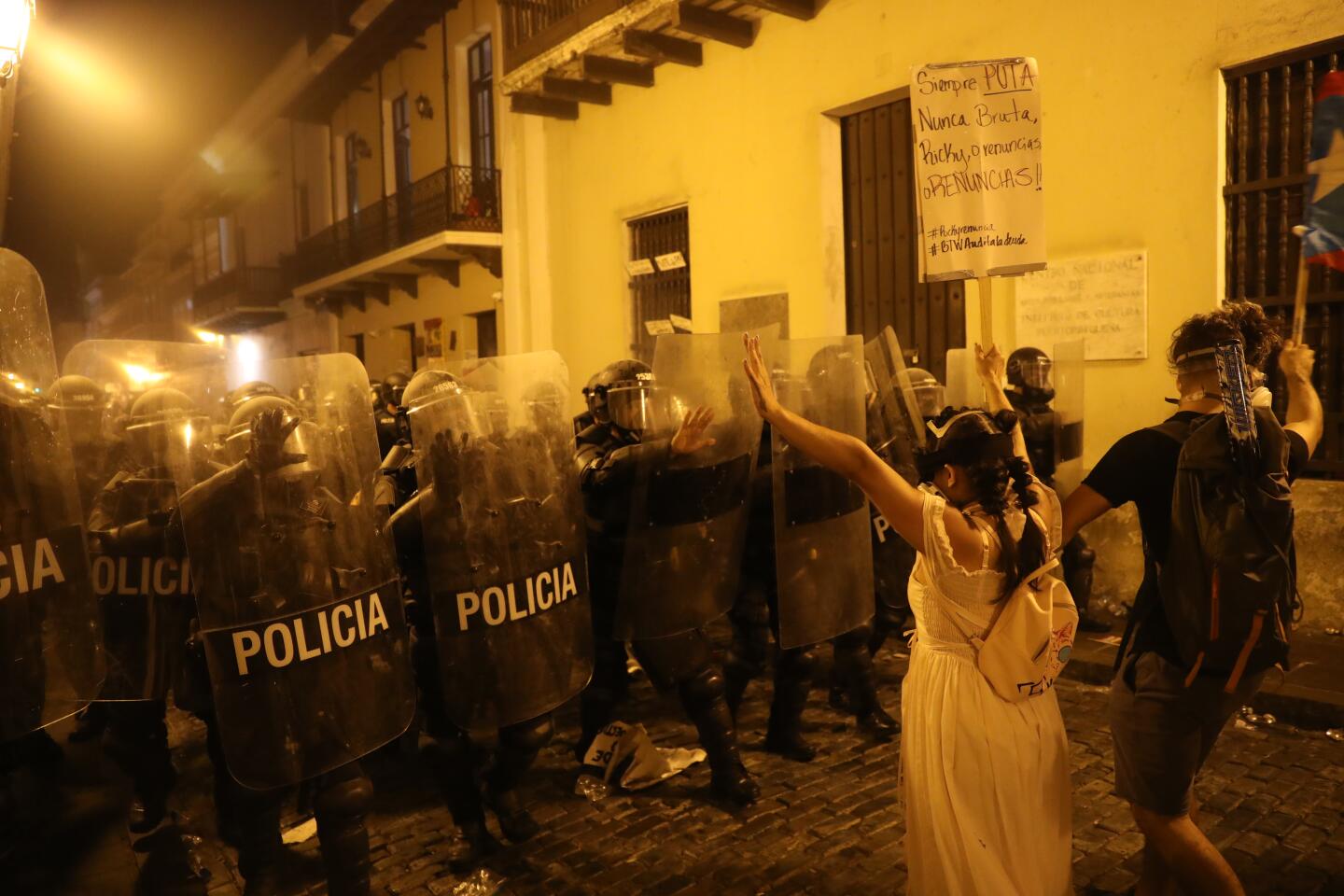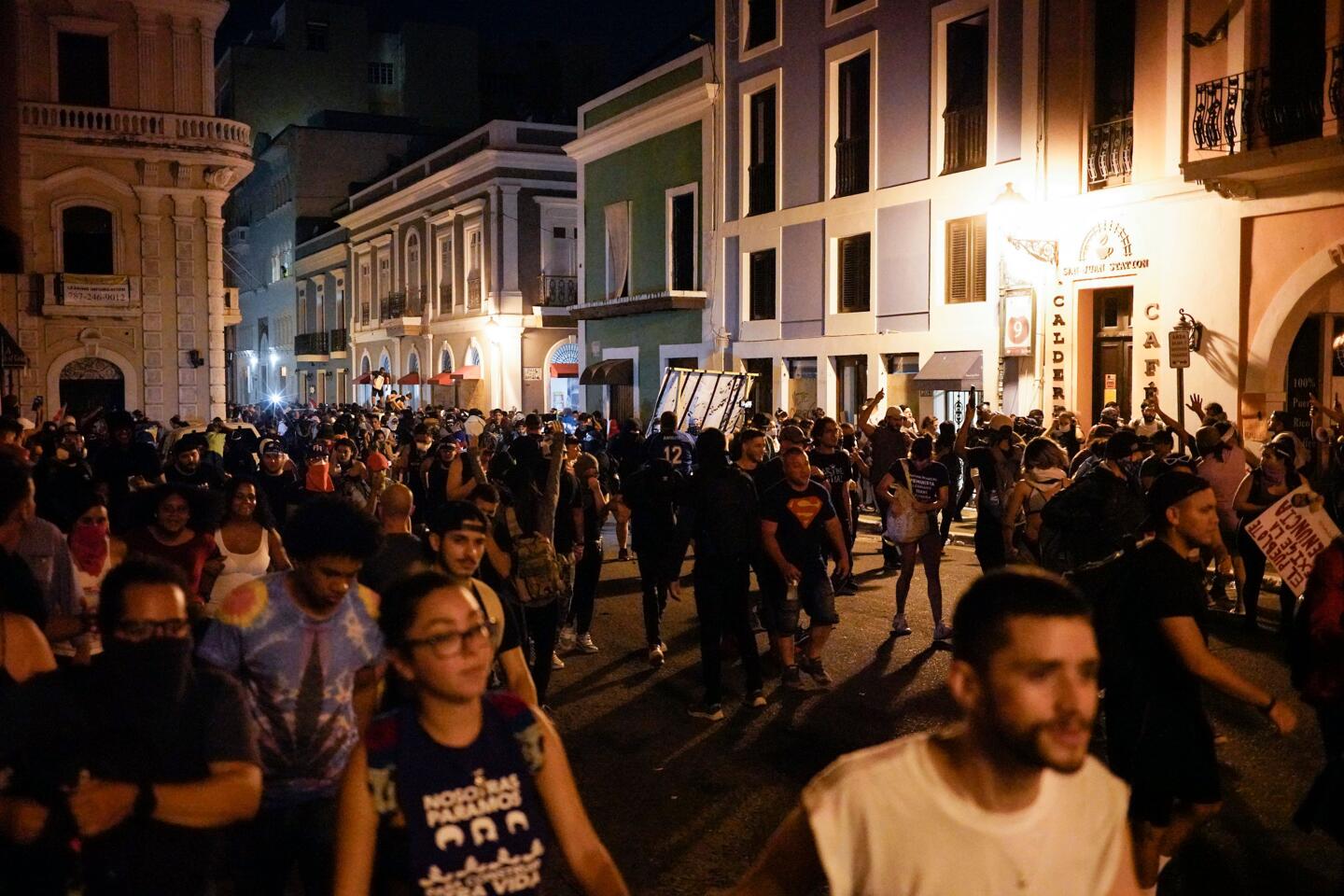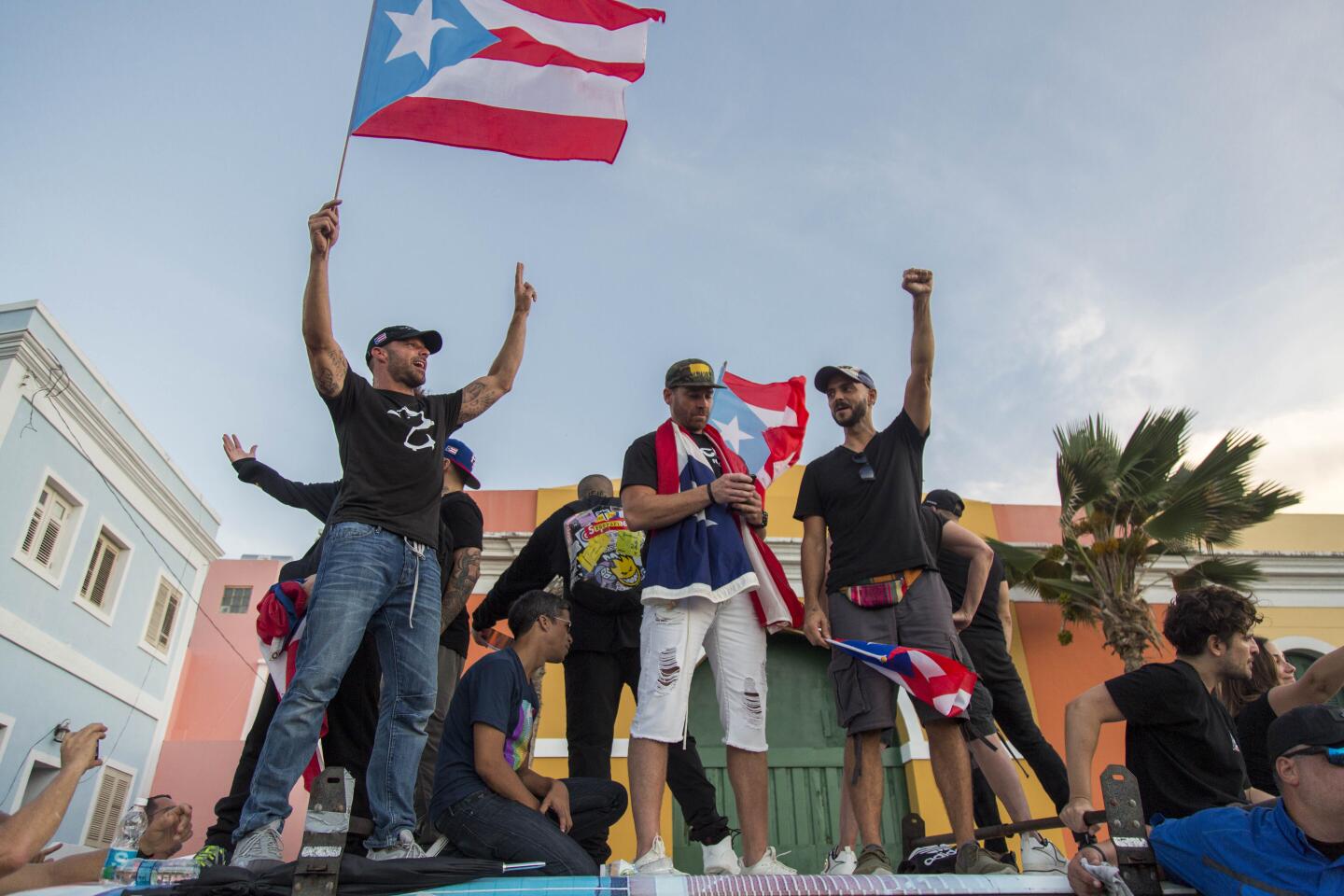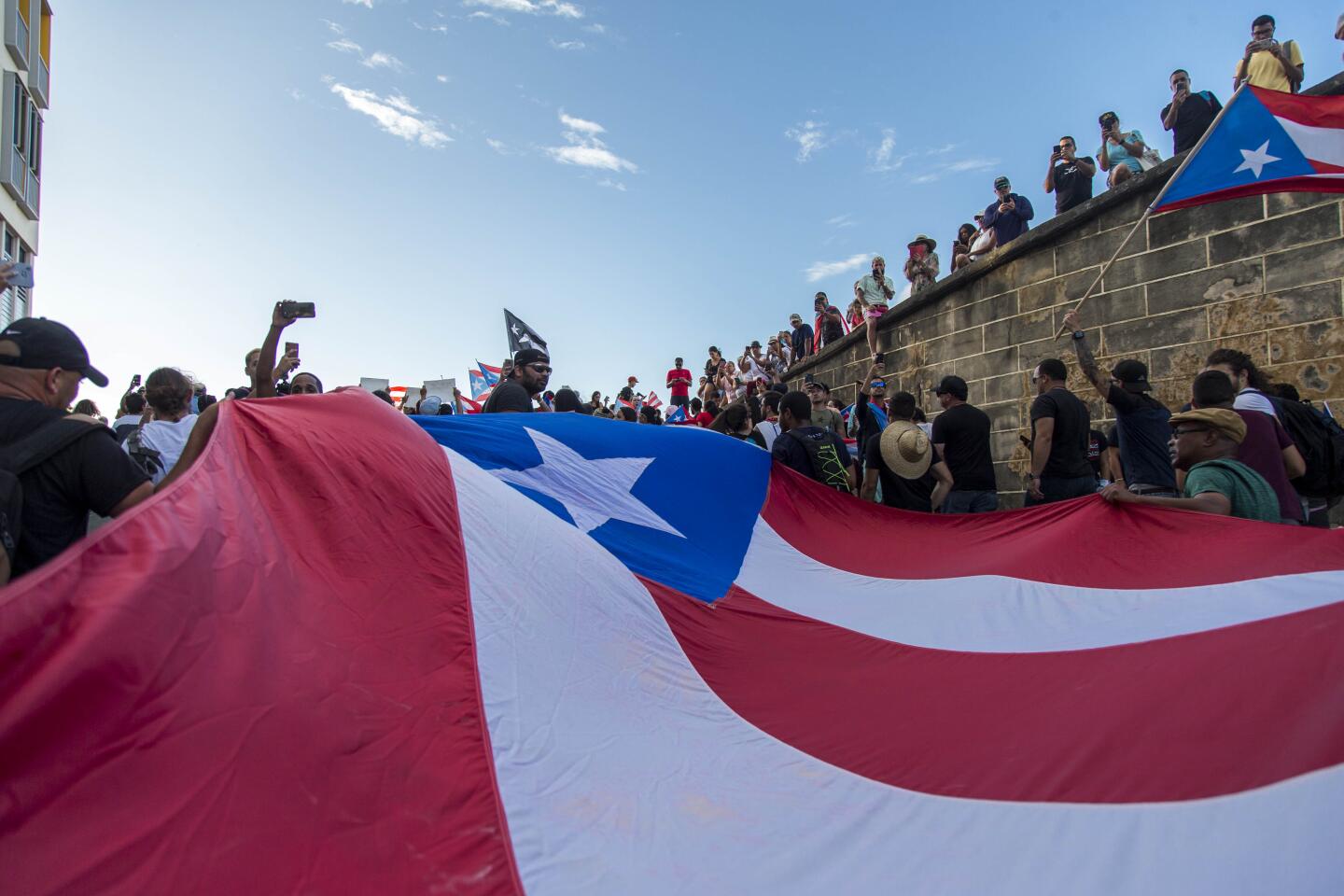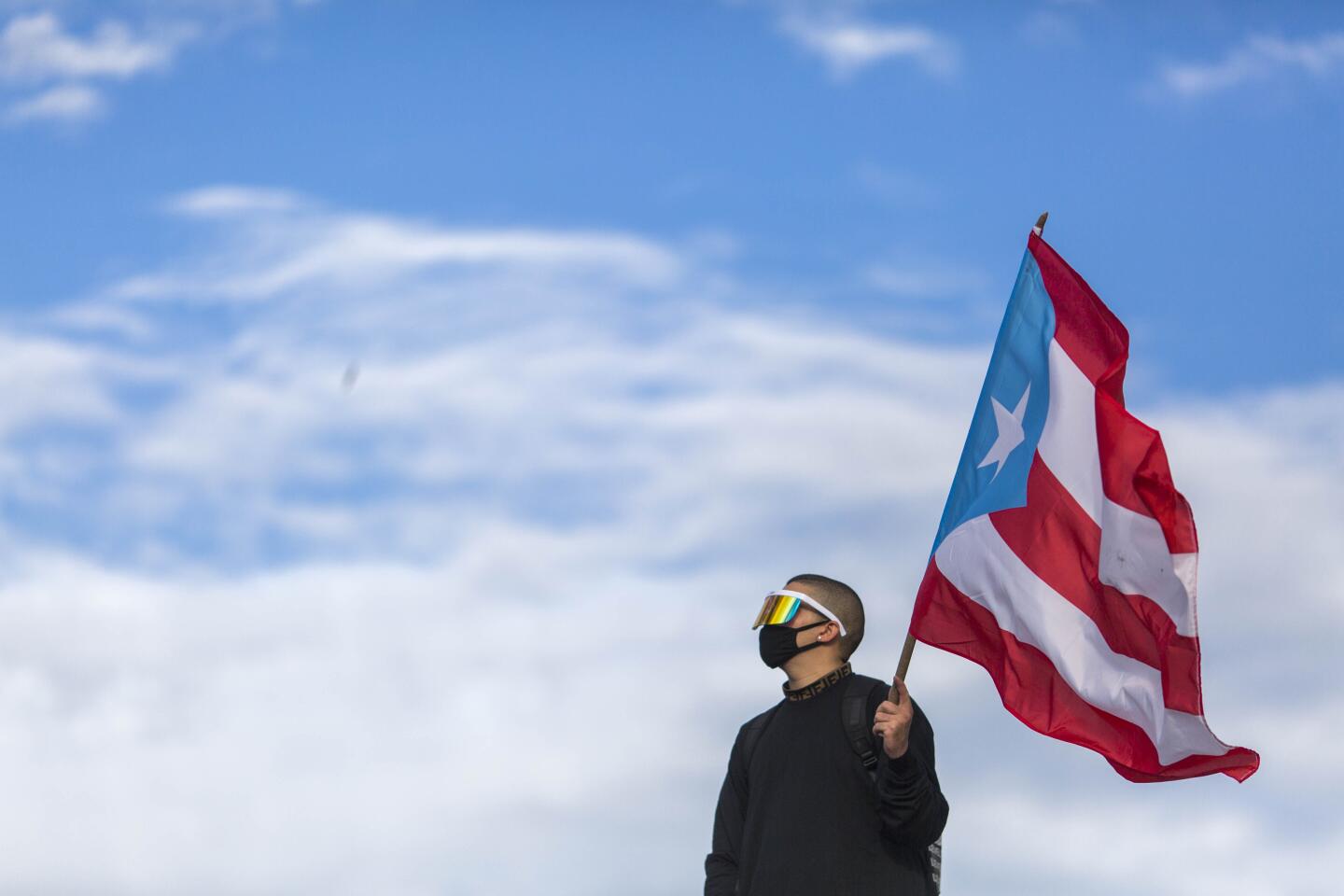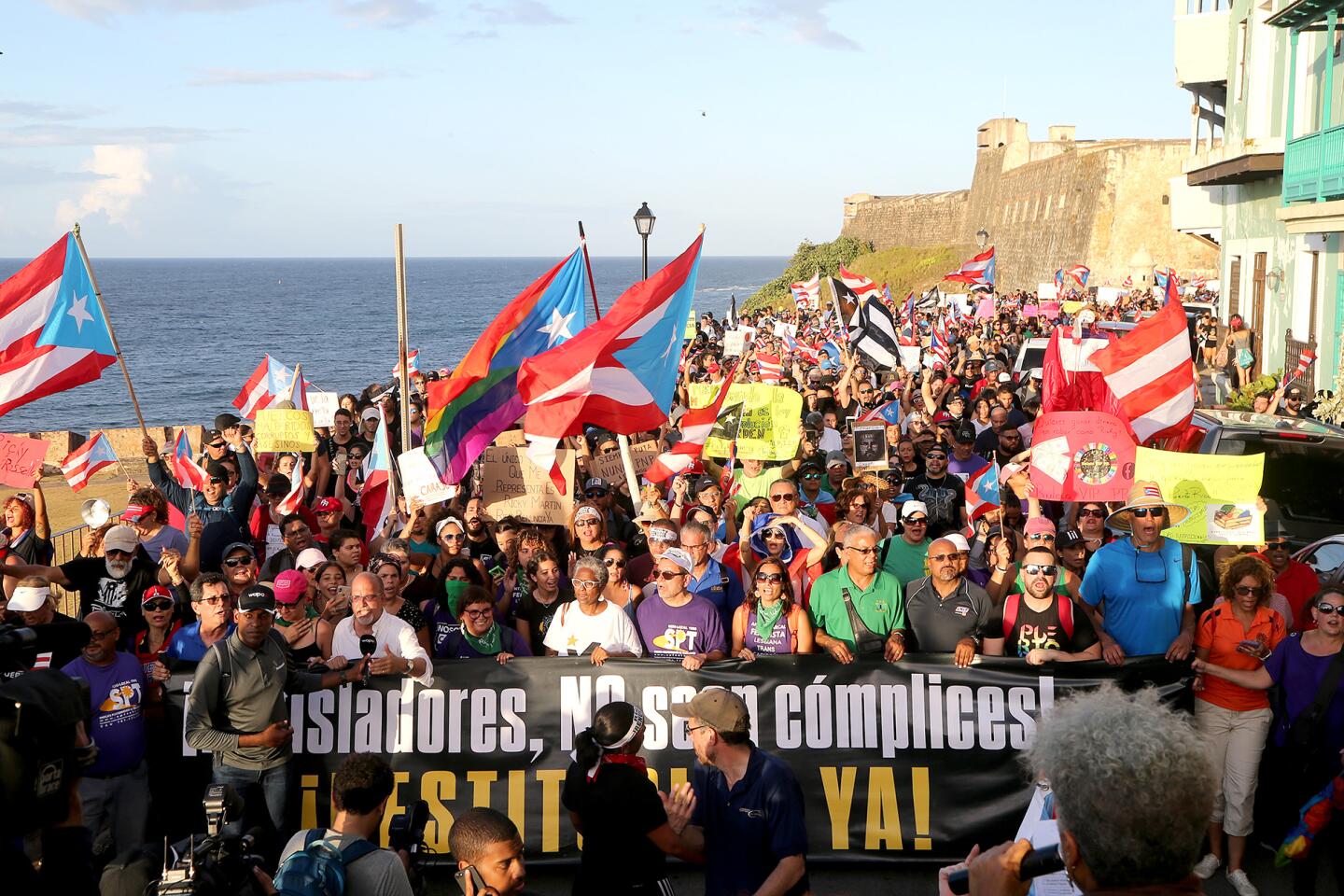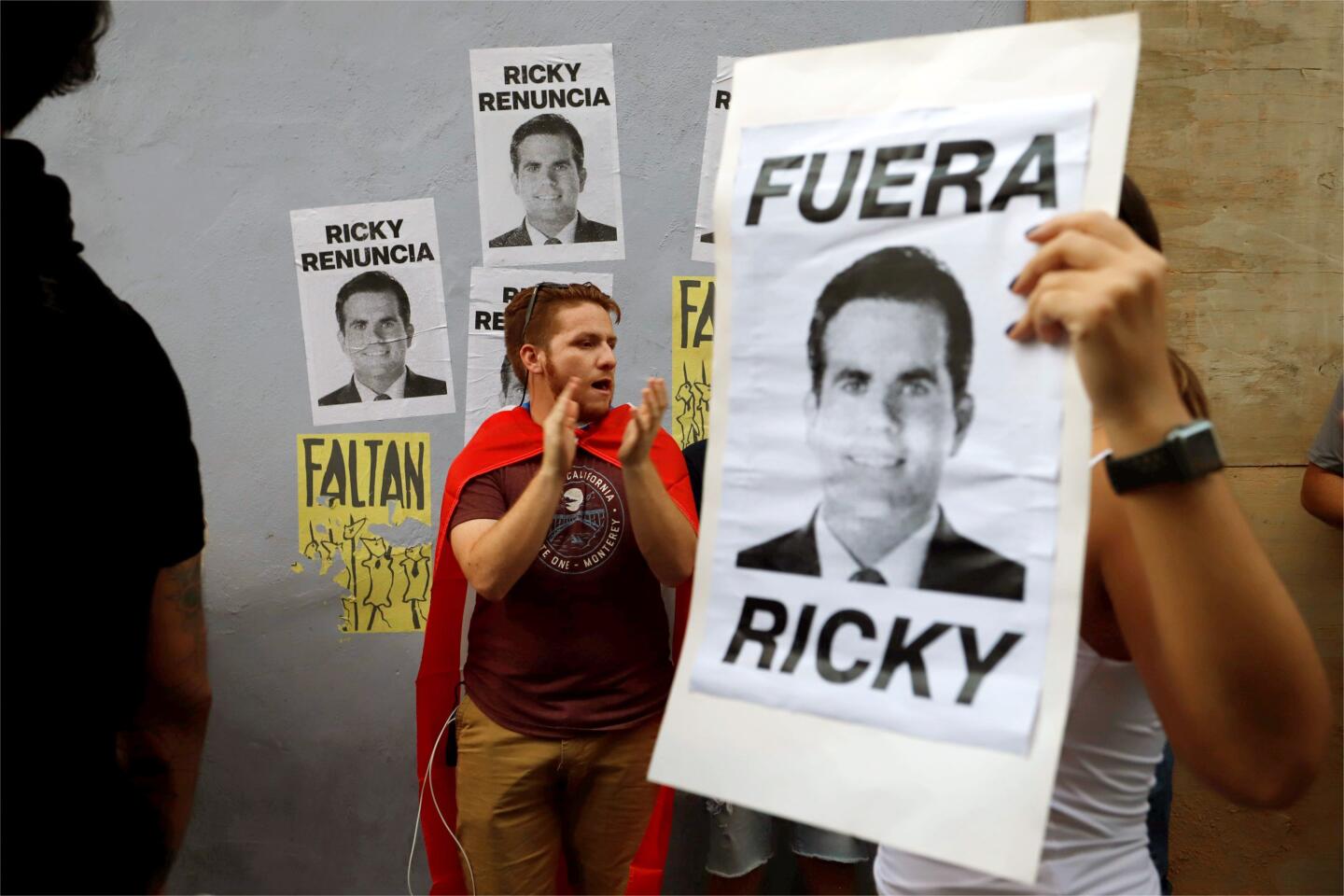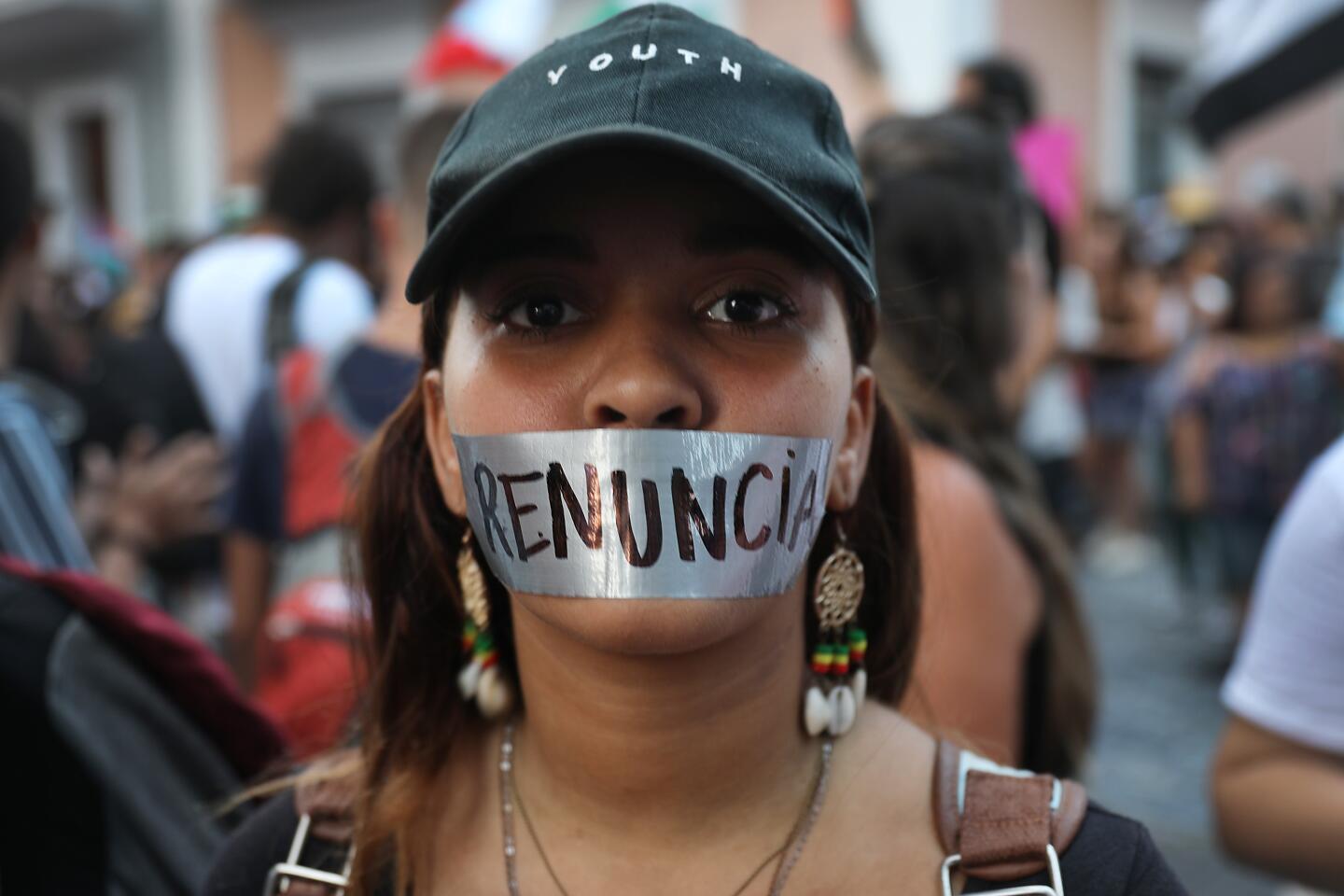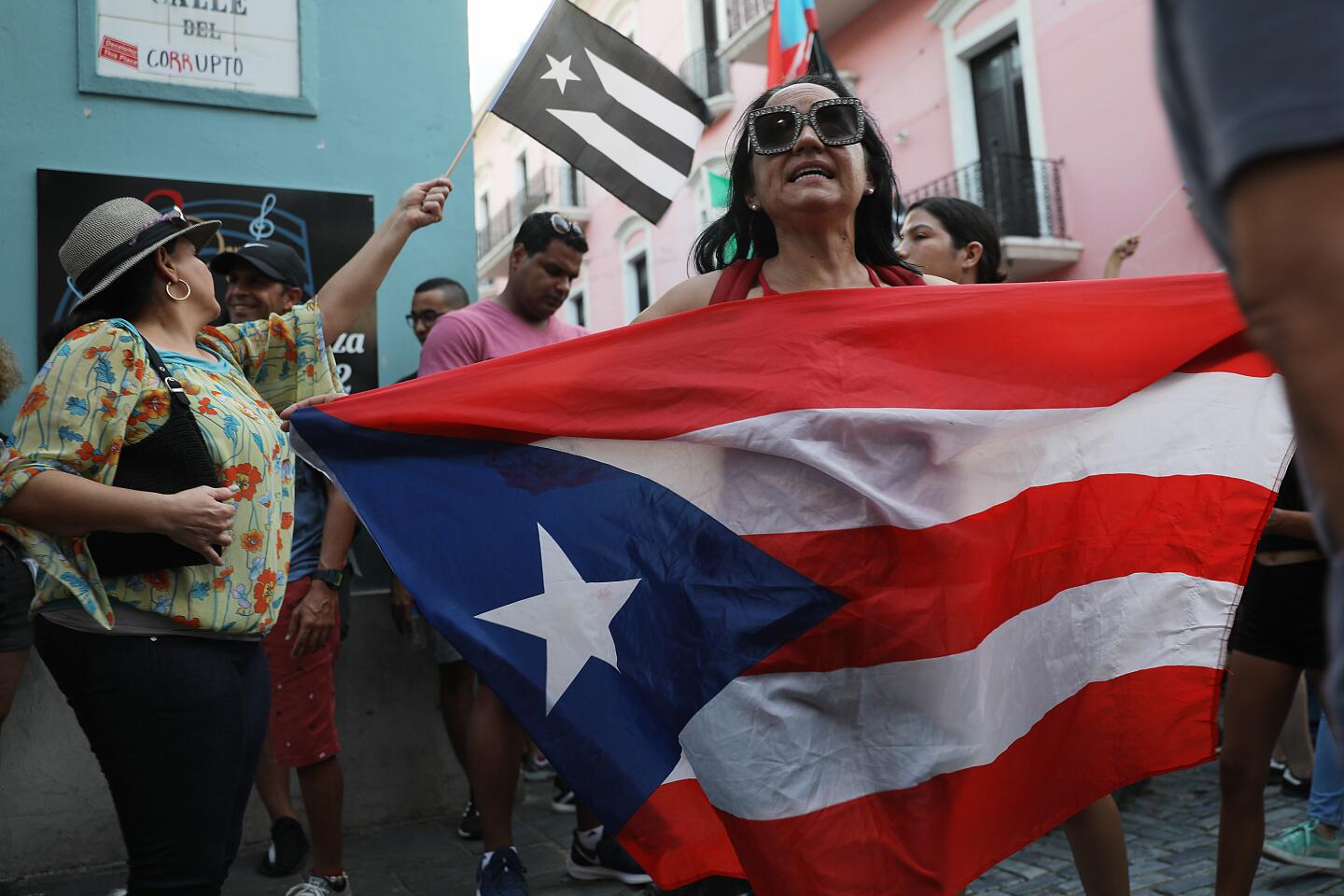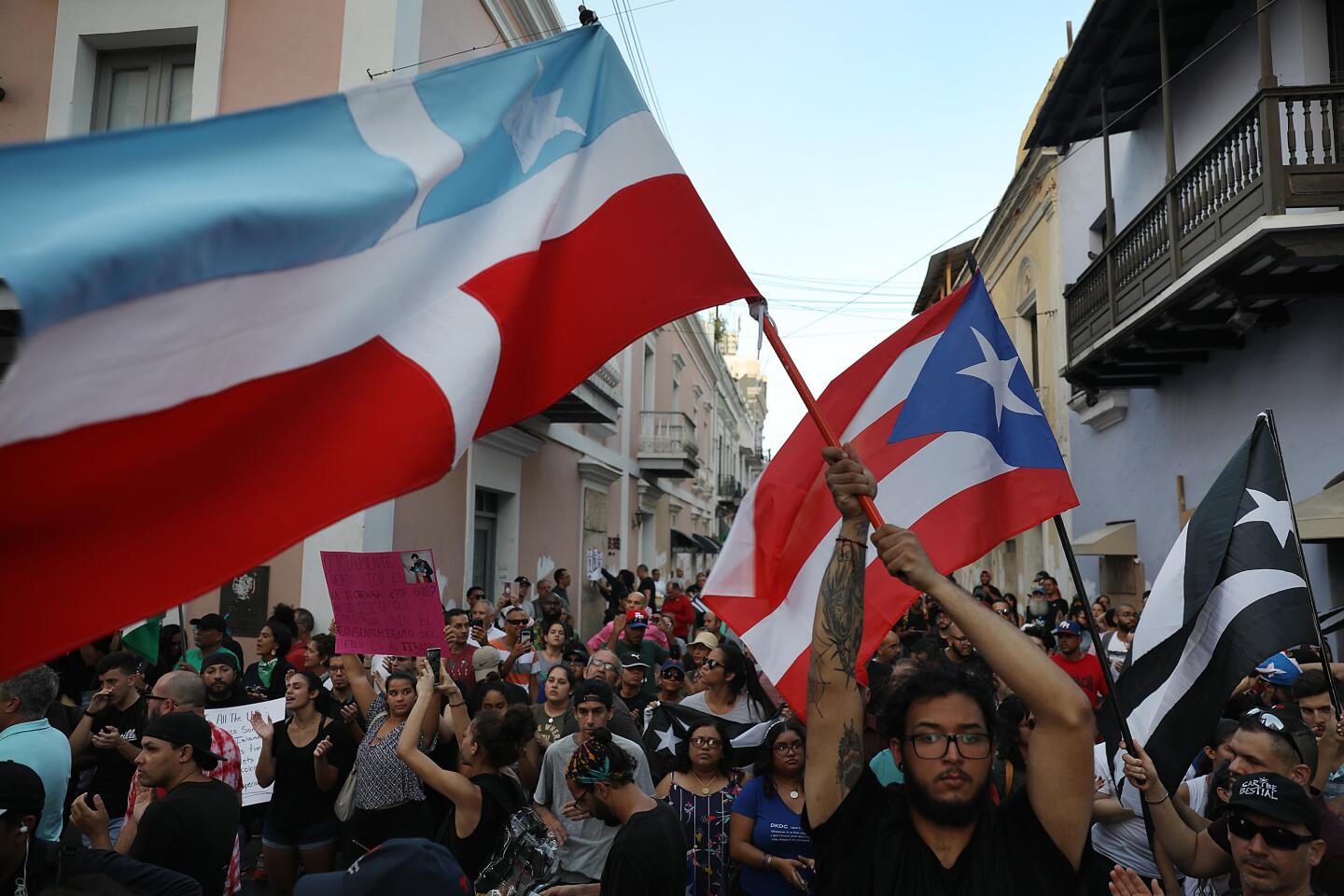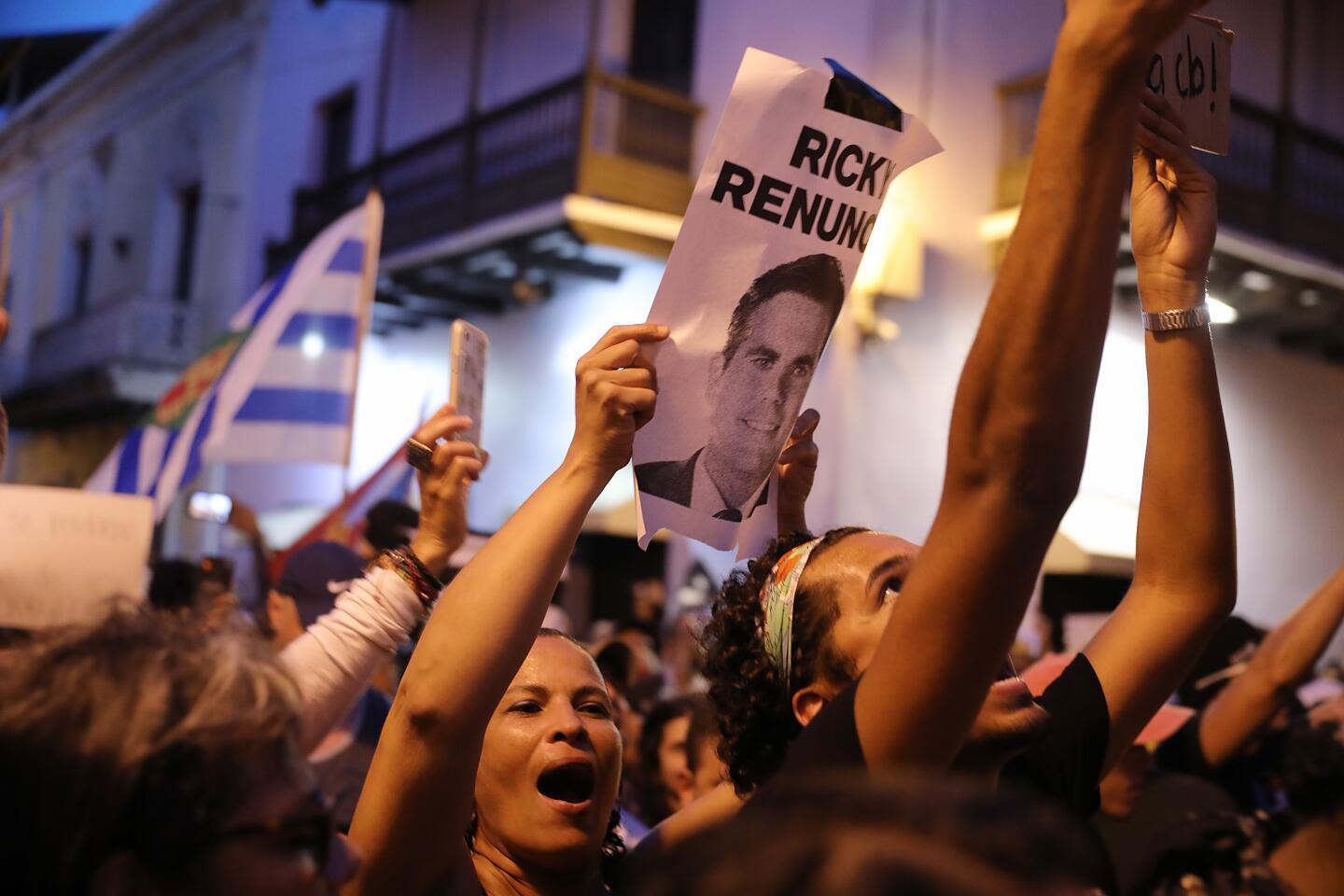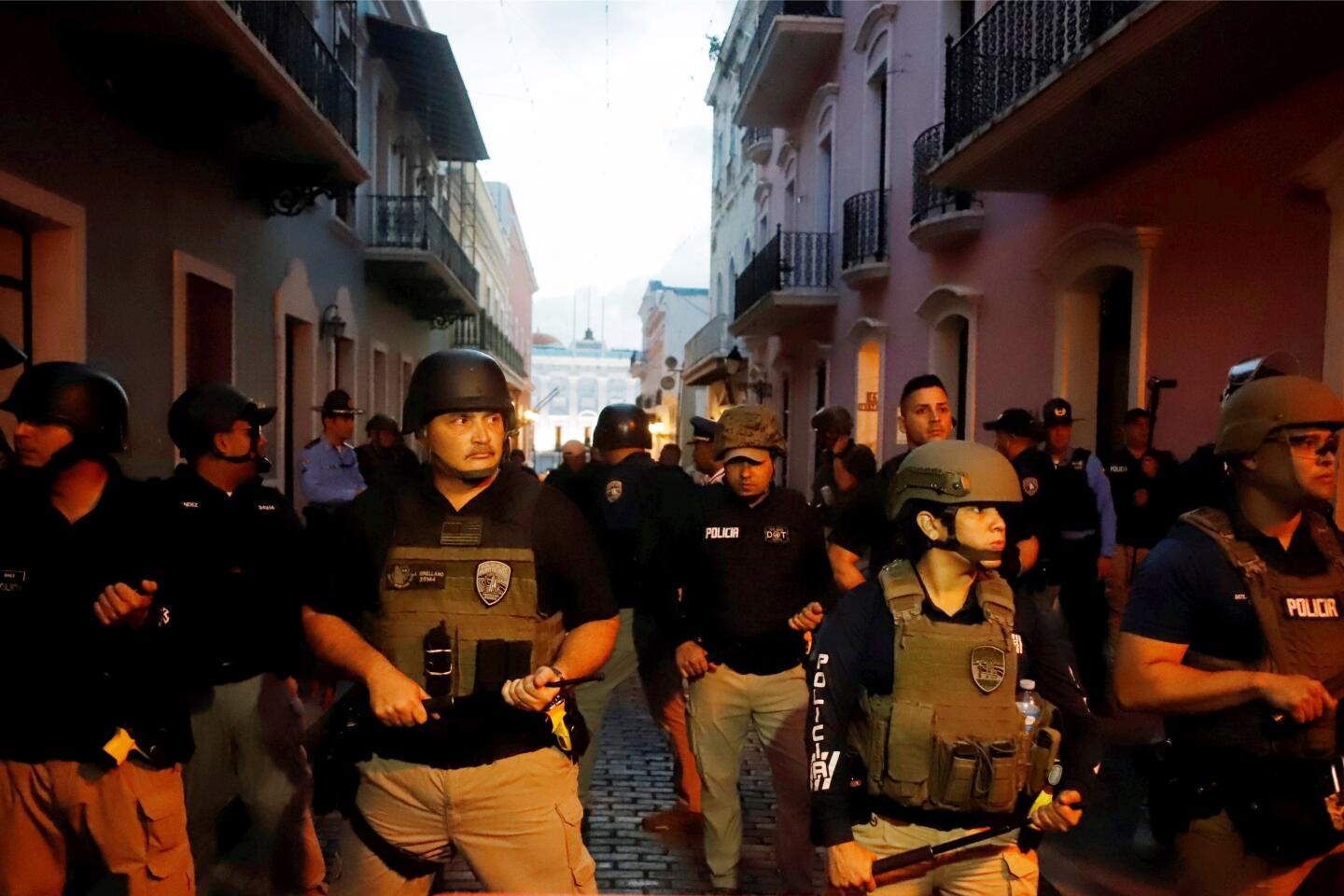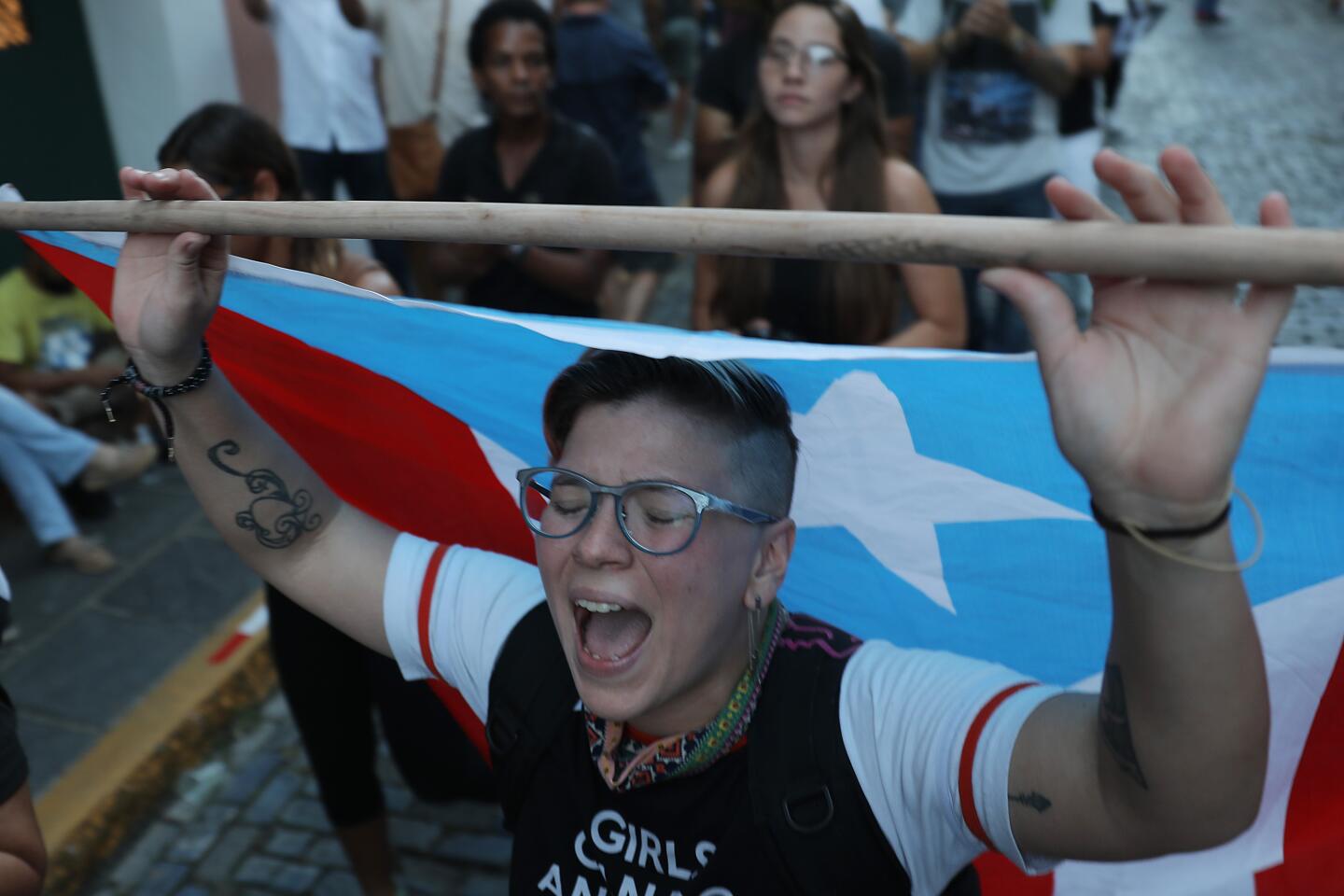The massive push for Puerto Rico Gov. Rossello to resign grew from several key factors
- Share via
Puerto Rico Gov. Ricardo Rossello appears destined to face relentless protests this week calling for his resignation.
Rossello, who has been criticized for his response to Hurricane Maria nearly two years ago and other matters, found himself on especially shaky ground this month when federal authorities levied corruption charges against two former high-ranking Puerto Rico officials in his administration. Then, after a series of leaked private group chat messages including profane, sexist and homophobic comments sent between Rossello and some of his top aides and cabinet members surfaced, the island erupted in protest.
Tens of thousands of people have turned out for protests in San Juan, the capital of the U.S. territory, for more than a week pressing for Rossello to step down. He has remained firm in his refusal to resign, though he announced Sunday that he would not seek reelection.
The governor, just two and a half years into his term, is a 40-year-old academic; trained in chemistry and biomedical engineering, he once represented Puerto Rico in the International Mathematical Olympiads. He is part of the New Progressive Party, which advocates for Puerto Rico’s statehood.
The island, which has a population of about 3.4 million, has been part of the United States since 1898, when Spain ceded it at the end of the Spanish-American War. Congress made Puerto Ricans U.S. citizens in 1917 and the island’s commonwealth status has existed since 1952.
Rossello is a political neophyte viewed largely as an extension of his father, Pedro Rossello — a former governor whose tenure from 1993 to 2001 was also mired in scandal. His father’s executive assistant and the former secretary of education were convicted of kickback schemes. Pedro Rossello lost his reelection campaign in 2004, tainted by a stream of corruption cases brought by federal prosecutors.
The normally media-ready younger Rossello went mostly quiet as calls for his resignation mounted, before issuing his statement Sunday.
How has Hurricane Maria influenced sentiment about Rossello?
Many Puerto Ricans were wary of Rossello since long before the leaked messages.
About nine months into Rossello’s tenure as governor, Hurricane Maria hit on Sept. 20, 2017, creating emergency conditions on the island. The strongest storm to strike Puerto Rico in more than 80 years laid waste to homes and left areas of the island without electricity for months. As people searched desperately for clean water, food and medication, concerns mounted about the lag of emergency assistance from the federal government.
Many Puerto Ricans felt Rossello appeared weak when President Trump visited the island nearly two weeks after the storm and seemed to downplay the devastation, striking a tone many observers considered insulting. An official hurricane-related death toll of 16 at the time has increased to estimates of more than 4,000 killed during and after the storm.
Since then, Trump has said Puerto Rico was using up funds for disaster relief, and referred to officials as incompetent and corrupt. A bill that would provide billions of dollars in disaster relief to communities across the country still recovering from hurricanes, wildfires and flooding faced repeated delays in Congress in recent months as Trump pushed back against sending funds to Puerto Rico.
Jorell A. Melendez-Badillo, an assistant professor of Latin American and Caribbean history at Dartmouth College, said that early on during the hurricane recovery some Puerto Ricans started sharing memes on social media sites targeting what they viewed as a “subservient relationship of Rossello trying to please Trump.” The memes, he said, often used a photo that captured the governor grinning and holding his phone out as if taking a selfie while sitting next to the president.
“That was a huge blow to the Rossello administration and how he was viewed,” Melendez-Badillo said. When Harvard released a study estimating the true post-Maria death toll likely exceeded 4,000, people’s indignation only increased, Melendez-Badillo said.
San Juan Mayor Carmen Yulin Cruz has led continued criticism of Trump’s treatment of Puerto Rico and Rossello’s behavior. In March, she announced her candidacy for governor.
What are the corruption charges surrounding Rossello’s officials?
Federal authorities revealed an extensive corruption investigation of the island’s highest echelons of government, announcing arrests and criminal charges against six people, including two former officials, for allegedly steering $15.5 million in federal contracts to well-connected consultants.
Julia Keleher, the former education secretary, and Ángela Ávila Marrero, the former executive director of the Puerto Rico Health Insurance Administration were among those charged.
Why did a series of leaked chat messages prompt Puerto Ricans to protest?
Puerto Rico’s Center for Investigative Journalism surfaced 900 pages of internal messages on July 13, unearthing derogatory, sexist and homophobic comments sent between the governor and his aides, as well as jokes about bodies accumulating after the hurricane.
“It’s like if you had 900 pages of Trump discussing Russia and discussing how to deal with the investigations — plus all the other barbarities that Trump would say about women, about minorities, about everybody,” said Juan Angel Giusti Cordero, a history professor at the University of Puerto Rico.
Under fire, Rossello apologized for the “inappropriate” comments he made in the group chat messages, but has remained otherwise defiant, saying he did not do anything illegal.
How does Puerto Rico’s status as a U.S. territory and its history with colonialism factor in?
On the streets of San Juan, protesters chanted, “Ricky, renuncia…y llévate la Junta” calling for Rossello to resign and take with him a fiscal control board installed by Congress to oversee the island’s finances in an effort to curb financial mismanagement, Giusti said. But the board, legislated by Congress in 2016, is seen as an arm of colonial control that further robs the territory of autonomy.
The board has been in place since 2016 when Rossello was elected, associating him with its unpopular austerity measures that stripped funding from Puerto Rico’s largest public university and bonuses from municipalities.
Slow hurricane recovery, disappointment with the local government and tension with the federal government on top of the territory’s yearslong economic recession — with the island more than $70 billion in debt — give the protests an edge and an additional urgency, analysts said.
Marisol LeBron, an assistant professor of Mexican-American and Latina/o Studies at the University of Texas at Austin wrote in an essay that for Puerto Ricans, the leaked chat was only the “latest reminder of the ways that their lives are devalued and their futures circumscribed by both colonial rule and the avarice of local elites.”
“Protesters are speaking out against the content of the chats, but they also are voicing a set of much broader demands to fundamentally reshape Puerto Rican society,” she said.
More to Read
Sign up for Essential California
The most important California stories and recommendations in your inbox every morning.
You may occasionally receive promotional content from the Los Angeles Times.
